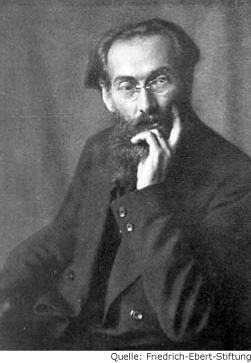The Political Thought of Gustav Landauer
Dr. Cédric Cohen-Skalli (University of Haifa)
14.11.2023 um 19:15 Uhr

The brutal murder of Gustav Landauer committed by the Freikorps during the demise of the Munich Räterepublik on 2 May 1919 is a well-known tragedy that had dark consequences for the Weimar Republic. The figure of Gustav Landauer is not easy to grasp. He was a fin de siècle writer, a translator, a politician, a journalist, a political thinker, and a revolutionary figure. This complexity goes along with the fact that Landauer was not a socialist and a revolutionary of a known kind, as his opposition to WWI, Bolshevism, and the new Weimar Republic made public. Indeed, Landauer refused unto his death to surrender to Party politics or to rally a Revolution understood as a technology of seizing power. Paradoxically, Landauer endorsed a view of social change he labeled ‘Antipolitik’ – which fought against modern hypertrophy of politics and attempted to free men and societies from the abstract State entities they were building to enslave themselves. Landauer aspired to a revolutionary return to a communal life that did not rely on the separation between the care for the body and the care for the spirit and whose principle of organization was both immanent and spiritual. This lecture will reconstruct the major points of Landauer’s political outlook and shed new light on them.
Dr. Cédric Cohen-Skalli teaches early modern and modern Jewish Philosophy at the University of Haifa. He is the director of the Bucerius Institute for the research of contemporary German History and Society. His research focuses on the relationship of Jewish thinkers to two main philosophical shifts: the shift from Medieval philosophy to early modern thought (14th-17thcentury), and the shift from early modern to modern thought (18th-20thcentury). He published several books and many articles on diverse aspects of Jewish thought and literature in the Renaissance as well as in 19th and 20th century German speaking world and diasporas. His intellectual biography of Isaac Abravanel was published in the prestigious "the great men of the Jewish people" series of the Zalman Shazar Center and translated and augmented for The Tauber Institute Series For Study of European Jewry (Brandeis University Press). He recently edited the volume Skepsis and Antipolitics: The Alternative of Gustav Landauer. He is also translator of many works of Freud, Benjamin, Scholem, Idel and Abravanel and head of the new Project: "The Revival of Philosophy in the 19th-Century and Early 20th-Century Middle East: An Untold Story".
Veranstaltungsort: Historicum, Raum K 001
Anmeldung: juedische.geschichte@lrz.uni-muenchen.de
oder telefonisch 089 2180 5570

